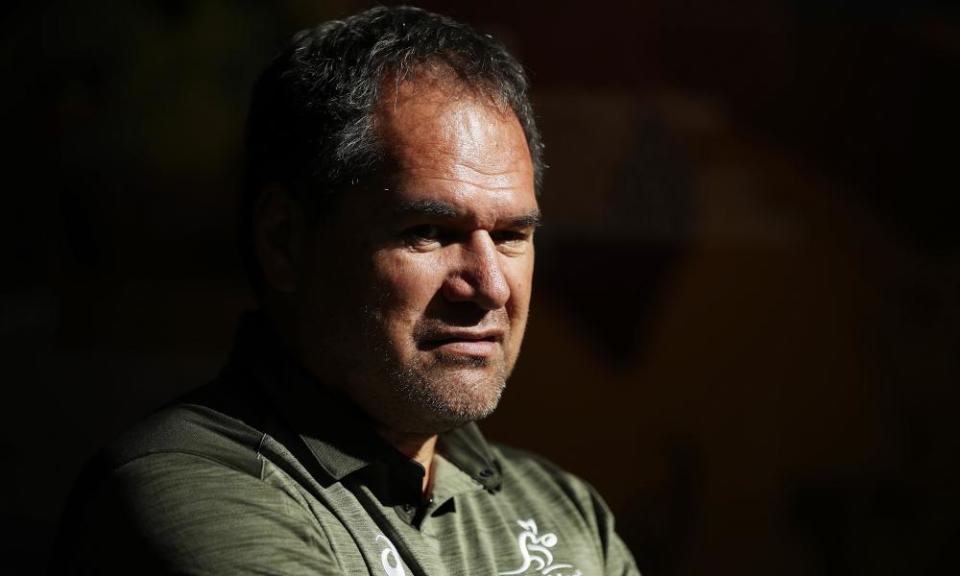Parochial selection policy fails to recognise Wallabies as the main event

Wallabies coach Dave Rennie has overlooked overseas-based Australian players for the 38-man squad for the three-Test series against France next month – but the only way this parochial selection policy can continue is for the national team to start winning again.
Only two overseas-based players were named in the squad – Wallabies captain Michael Hooper and second-rower Matt Philip. Hooper was on sabbatical with Japanese club Verblitz, while Phillip was on a short-term deal with French side Pau. Significantly, both players are contracted to Australian Super Rugby teams in 2022.
Several other high-profile overseas Australians such as Rory Arnold, Kurtley Beale, Adam Coleman, Samu Kerevi, Sean McMahon, Will Skelton and Tolu Latu were omitted or unavailable. Rennie did not use the Giteau Law, which makes overseas players with 60 or more Tests eligible for the Wallabies, and he also turned down the option of bringing back two players with less than 60 Test caps, preferring to pick local talent.
Related: Widening trans-Tasman gap gives Wallabies daunting Bledisloe Cup task | Bret Harris
This local-first approach has left Rennie with much the same pool of talent he had at his disposal last year when the Wallabies lost the Bledisloe Cup for the 18th consecutive year and finished last in the Rugby Championship behind the All Blacks and Argentina.
The squad for the France series included 11 uncapped players – Pone Fa’amausili, Lalakai Foketi, Len Ikitau, Feleti Kaitu’u, Andrew Kellaway, Rob Leota, Lachlan Lonergan, Andy Muirhead, Izaia Perese, Darcy Swain and Michael Wells. They are all good players, but would any of them provide the Wallabies with a point of difference against the All Blacks?
Australia are currently seventh in the World Rugby rankings, the country’s lowest ever position, indicating that what is being done is not working.
When the Wallabies won their only World Cup in the professional era – in 1999 – 100% of the Australian team played Super Rugby. It was only players at the end of their careers who signed with rich clubs in Europe for their “superannuation” contracts. Since then the trickle of Australian players overseas became a mass exodus, leading to the introduction of the Giteau Law prior to the 2015 World Cup where the Wallabies finished runners-up to the All Blacks.
The problem for Australia now is that players in the prime of their careers are eschewing the pride of wearing the gold jersey for the riches on offer in Europe and Japan. South Africa suffered an even bigger player drain overseas and responded by adopting an open slather selection policy for the 2019 World Cup in Japan, which the Springboks won.
Rennie did not want to emulate South Africa’s selection policy because he feared Australian players would “leave in droves” to rich overseas clubs, but players are leaving anyway. Three members of the current Wallabies squad – Marika Koroibete, Isi Naisarani and Brandon Paenga-Amosa – are leaving Australia at the end of the year.
The argument against selecting overseas players has always been that it would potentially undermine Australia’s Super Rugby teams, but what is the point of propping up provincial sides at the expense of the Wallabies? The Wallabies are the main rainmakers in Australian rugby, but the national team’s capacity to fund the rest of the game will be further eroded unless the team is successful. By historical standards, that means winning Rugby Championships, Bledisloe Cups and World Cups.
For the Wallabies to win big trophies again, they will need Australia’s best players to be available for the national team no matter where they play club or provincial rugby. Imagine if basketball’s Boomers or football’s Socceroos did not select overseas players. Sooner or later Super Rugby may have to accept it is an NBL or A-League type competition and recognise the Wallabies are the main event. Perhaps Australian rugby has not quite reached this tipping point, but it cannot be too far away.
With only local talent Rennie should still be able to assemble a competitive Wallabies team, but there are questions over it being a winning side. The average age of the squad is 25, suggesting Rennie is developing a young team for the 2023 World Cup in France. That is not surprising, given he has previously stated he already knows the composition of that squad, but Australian rugby needs the Wallabies to win now, starting with the three-Test series against France next month.
Rennie dismissed Australia’s appalling 2-23 win-loss record against New Zealand opposition in the Super Rugby Trans-Tasman competition as irrelevant to the Wallabies. It is, and it isn’t. Fortunately, Rennie only has to select 23 players for the Wallabies’ match-day squad, not 115, but the Australians will still have to overcome the psychological trauma of losing week after week in the trans-Tasman competition.
The France series will be brutal with three Tests in the space of 11 days, but it will give the Wallabies an opportunity to develop their combinations and strategies for the Rugby Championship and Bledisloe Cup. And even if France send out a second string team, it will be important for the Wallabies to regain that winning feeling.
Yet the Wallabies would have a better chance of winning if they selected the best Australian players from around the world. If they are to continue with the current selection policy, the Wallabies will need to regain the Bledisloe Cup and demonstrate they are a genuine chance to win the World Cup. Otherwise, things must change.

 Yahoo Sport
Yahoo Sport 





































